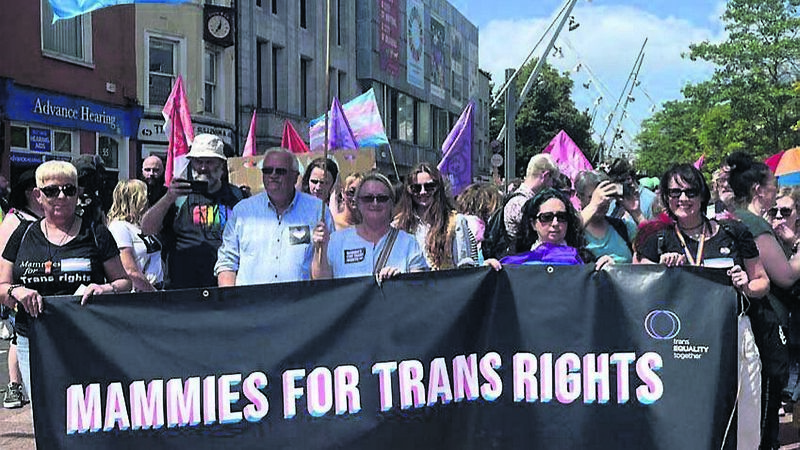Cork Views: Why Old Ireland still fears its trans citizens

The Cork Trans and Inter Sex Pride event in the city last year
A society once lauded for progress on LGBT+ rights now grapples with a new frontier of bodily autonomy - and the uncomfortable truths it reveals about itself.
Ireland’s struggle to recognise and accept its transgender citizens is exposing profound questions about national identity, cultural values, and the true depth of our commitment to equality.
Internationally, Ireland is celebrated for its literary giants and global peacekeepers and, more recently, for progressive milestones: the passing of marriage equality in 2015 and the repeal of the Eighth Amendment in 2018, both hailed as signs of a modern, inclusive nation.
But beneath this polished reputation lies a society still grappling with the weight of a deeply conservative past - one that remains uneasy with challenges to rigid ideas about bodies, gender, and moral order.
Bodily autonomy is once again at the heart of the debate around trans rights: who owns the body, and who gets to decide what it means? What does recognition of transgender status mean in all of this?
Transitioning gender is not a decision made lightly. It entails medical, emotional, and social costs, including the painful risk of losing family and facing daily hostility.
Yet it is not a mental illness; the suffering lies not in being trans but in being forced to conform to norms that do not fit.
For many conservatives, the idea a person can self-determine their gender feels like a step too far; a threat to long-standing social categories that have shaped family, faith, and the economy alike.
Where homosexuality was once criminalised and pathologised, transgender people today face medical gatekeeping and psychiatric labelling that often delays or denies gender-affirming care.
Much of Ireland’s pride has always rested on self-determination. Yet that pride coexists with a history of tightly policing bodies, our bodies especially as women and then those of children - seen starkly in the dark chapters of the Mother and Baby Homes, the Magdalene Laundries, and the pervasive culture of silence around sexual abuse and domestic violence.
Even today, we survivors often find the justice system stacked against us, deterring us from coming forward.
Speaking personally, as a cisgender heterosexual woman, none of my interactions with transgender people have ever caused me discomfort, danger or fear. Unfortunately, I cannot say the same about many of my experiences with cisgender heterosexual men. The current system has not only failed me, but countless other women who have experienced violence and sexual violence at the hands of cisgender men.
For centuries, Irish society has found comfort in binary certainties. Faith, law, and social custom have conspired to maintain order by policing whose bodies matter and how.
The existence of transgender people forces us to question the very basic biology we were taught at secondary school.
The concepts that have kept us in biological silos for so long might have to be questioned honestly and openly - and that is terrifying. The idea of developing the legal, philosophical, theological justification for how you can make the body mean something to bind you in place as part of a larger geopolitical and economic structure.
As a nation that prides itself on being progressive, we still have considerable work ahead to address the significant gaps in transgender rights.
Although the Gender Recognition Act Review has begun, it has yet to result in legislation, currently preventing the extension of self-identification to minors and the recognition of non-binary individuals.
The passage of the Criminal Justice Bill of 2022 could significantly enhance protections for gender identity. It is crucial to heed the calls of respected organisations like TENI for depathologised and decentralised healthcare.
Additionally, implementing a legal ban on non-consensual surgeries on intersex infants is imperative.
How can we, with any sense of honour or dignity, justify the hypocrisy of allowing these surgeries on intersex infants on one hand, while on the other hand we deny individuals the right to choose their gender identity later in life? Why is it more acceptable to Irish society for parents or surgeons to make this remarkably significant decisions for infants, than for the individual themselves to make this deeply personal decision in an informed and consensual way?
Today, transgender people expose uncomfortable questions that Ireland has long chosen to ignore: about who suffers in silence, whose pain is inconvenient, and what harm is done when the majority looks the other way.
The very structures that once justified hiding unmarried mothers or ignoring domestic violence persist in subtler forms whenever society privileges ‘respectability’ over the freedom to live openly. From the laundries to the cover-ups of clerical abuse, we know too well the price of pretending not to see.
The fear of transgender people is, at its heart, a fear of losing old certainties. It is the fear of acknowledging that gender is more complex than we have allowed, that parenting must be unconditional, and that equality means more than tolerating what is familiar
A nation once silenced by shame now has a choice: to repeat old cruelties under new names, or to listen - and live up to the ideals it claims to hold dear.
- The Cork Trans and Inter Sex Pride march starts at 2pm from Cork City Library on Grand Parade this Saturday, July 12, gathering at 1.40pm.







 App?
App?




